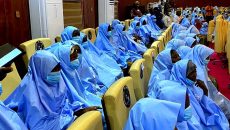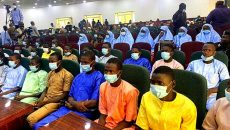Education as a liberator is an incontestable fact. Any investment in education is therefore not just money well spent, but it is a catalyst for advancement in society. It is common knowledge in Zamfara State that Governor (Dr) Abdul’aziz Yari Abubakar‘s administration has made sure that no child is denied access to quality education. It is a common factor that primary education has always been the foundation upon which the entire education structure rests on or is built. Governor Abubakar’s silent revolution in education has convinced the people of Zamara State that he is for real. He has taken far-reaching measures to rescue the educational system from an impending collapse and decay of the past. The colossal amount of financial resources committed has led to the drastic upliftment of standard of primary education across the state underscoring the slogan of ‘catch them young’. His predecessors tried their best to improve access to basic education but Governor Abubakar surpassed them by bringing about unprecedented transformation that the sector is witnessing today. At the inception of his regime the situation was so bad that primary schools were in deplorable condition. The challenge was enormous but Governor Abubakar remained undaunted. There were dilapidated structures, dearth of qualified manpower and problem of ghost workers, no furniture, no course to quality and standard. Governor Abubakar who is an achiever did not allow that to weigh him down because he possesses the willpower to confront the rot and decay in the sector.
The first step he took is to form Zamfara State Primary Education Assessment Committee, ZSPEAC, which comprises of eminent professors and renowned educationists from various academic disciplines. Six professors, 15 doctorate holders (Ph.D.) and other professionals from colleges of education, state polytechnics and from within the state civil service was mandated to assess the situation on ground. They came up with a report which was later published and used in assessing the primary education system.

Hajiya Asmau Abdul’aziz Yari distributing wheels chairs for special education, Gusau with Murtala Adamu Jangebe
And to drive the revitalised education system, Governor Abubakar appointed Honourable Murtala Adamu, Mutawallen Jangebe, a thoroughbred professional teacher and administrator in 2011, as the executive chairman, Zamfara State Universal Basic Education Board, ZSUBEB. He was also the immediate past deputy speaker of Zamfara State House of Assembly. Honourable Adamu understands the importance of education in the administration. Before his appointment, ZSUBEB was in a sorry state and everything was grounded. It was not functioning the way it is supposed to. But with Hon. Adamu in the wheel of ZSUBEB, much emphasis has been placed on capacity building as well as manpower development. He started by establishing a teacher’s training centre with state-of-the-art facilities. It sits on a vast land, has accommodation for over 600 students coupled with classes with modern teaching equipment.
From infrastructure to quality education, there is remarkable progress. The goal of government is to ensure that it competes effectively with any other state in the country or even supersedes them in the delivery of primary education to its citizens. To show that it is not a mere political statement, teachers training centre has been built to accommodate between 6,000 and 7,000 intakes at a time at Gusau. It is ICT equipped to prepare teachers for the latest demand in teaching profession.
This centre can be called ‘Governor Abubakar Yari Centre of Excellence’ and it is the first of its kind in Nigeria.
Regarding quality education many teachers are trained in various higher institutions across the country. A lot of teachers were sent for Special Education Training at Federal College of Education Special [Oyo] for training in different aspect of special education.
One of them, Mallam Bashir Muhammed, is now teaching some visually impaired students in his class.
Honourable Jangebe is an astute administrator and amazing achiever, who mounted the mantle of leadership at ZSUBEB with a wealth of experience especially concerning primary basic education. In this interview, he speaks on the challenges, projects and his mission and vision for the organization. Excerpts.
This board inherited a lot of liability in terms of infrastructure decay and dilapidated structure can you shared with us your initial experience?
When I came to this board in 2011, it was a sad story on what we met here. I am not talking politically but sincerely and honestly. We didn’t know the number of schools in existence; there was no record of teachers. The situation was so bad the payroll was not controlled and in total disorganisation. On the part of the schools, teachers were not available in schools, they don’t go to classes because there is no check and balances nobody cares so everybody does what he/she wants. Classrooms were dilapidated, there were no furniture for pupils to sit. And with that ugly situation we put our mind together to give a solution. We set out in the first day that we must do whatever it takes to give a child in Zamfara State the opportunity in terms of education, especially basic education. We resolved to holistically look at the problem of primary education and that led to the setting of the committee that was called Zamfara State Primary Education Assessment Committee (ZSPEAC) chaired by Professor Tukur Adamu of Usman Danfodio University of Sokoto having other five professors and many PhD and other eminent personalities who undertook a thorough assessment of the problem of primary education challenges, prospects and among others.
After six months they came up with a report, which was published. The report gave us the guide on how many students are in the school; how many teachers are in the school, how many schools existed and so on and so forth that gave us the blueprint on how to address the problem of primary education. That report led to the stakeholders’ meeting and everybody concerned with education was invited. His Excellency, Governor Abubakar was there, his deputy and all the State House of Assembly members were there, the former governor, National Assembly members, former senators, ministers, all our emirs were in attendance. They were shown the state of education in Zamfara State and many of them said the governor should declare state of emergency in education, which he said it is not necessary. He took the bull by the horns, and gave us one to two years to address the lingering situation. We designed our projects and then appointed consultants to supervise the construction of these projects.
What facilities did you put in place?
Then we considered that this is an ICT age and that our children will not be left behind, that prompt us to set up and established 41 ICT centres, which we fully equipped with computer and standby generators for power supply. Teachers were posted there and these teachers were specifically trained by the board to give them the edge to be able to face challenges in our schools. And then went in massive reconstruction and construction of this schools.
What other projects did you embark upon?
Then we went into massive reconstruction and construction of schools. In the first year – 2011-2012 – we built 330 new blocks of three classrooms and offices with furniture for both teachers and pupils. Renovated 52 township primary schools, I mean a school of about of 30 classrooms. We established training centres, which you have seen and it is to provide where teachers will be trained, whenever we are doing our in-service training programme. The place is equipped with ultra-modern facilities and ICT centres and a hostel that will accommodate 600 participants at a time. The place also has dinning room, conference room, shops so that when you go there you will know why you are there. Twelve classrooms, two hostel blocks, cafeteria, large auditorium hall with, lighting facilities and speakers and two duplex allocation for lecturers.
We are also have ongoing massive renovation of about 400 schools at the moment. When we say renovation it is not only the building, we also provide furniture. That is on the side of infrastructure.

A sample block of classrooms constructed and furnished by ZSUBEB under Governor Abubakar’s administration

A sample block of classrooms constructed and furnished by ZSUBEB under Governor Abubakar’s administration
How are the teachers trained?
Over 10,000 teachers have been trained and retrained in various fields which include Science and Mathematics, English, School Administration, Guidance and Counselling, Teaching Methodology and Computer. We are now doing closer system where we are now bringing teachers closer to the school to provide methods to guide each on a particular topic and the teacher will be asked to teach and demonstrate to students, so we have trained over 10,000 teachers within two years. During the period we did that exercise, we realised that more than 50 of our teachers were not qualified, so we sent a lot of them back school. Some of them are in the colleges of education, Maru; FCE Gusau, Sokoto and so forth. We have over 2000 teachers we have trained in either NCE or degree programmes apart from computers in-service training that we are providing for them.
How do you supervise these schools?
On school supervision, we designed a form which is implemented to compel teacher to be punctual to school. Headmasters must ensure how many lessons teachers take and how many lesson plans they prepare before going to their class. These are the conditions before the teacher gets his monthly pay. This has been on since last year and it has been giving us a lot of dividends in terms of teachers’ effectiveness and performance.
What are the incentives provided for teachers to bring out the best in them?
Before we came in, we realised that most of them were demoralised because of poor payment. Some of them in the rural areas have no accommodation and other incentives like paying them their leave grants promptly. Secondly one of the greatest incentives to give to teachers is training. This we will continue to do. Between 2011 and 2013, we spent not less then N140 million on their training and that is a lot of incentive in terms of capacity building. Thirdly, we realised that before our supervisors will be effective it is not just to go but by which means. We were able to convince the governor to provide mobility and means of transport for the supervisors and he acquired 400 motorcycles. And we are going to give them free of charge and N5,000 monthly allowance in fuelling and maintenance of the motorcycles so that they can be effective. We will also give them additional training to get them ready for the job. We have promoted over 5,000 teachers last year.
What is your focus and vision for this board?
First, I want to see that during this four years of Governors Abubakar’s administration we totally and completely address the issue of infrastructure. That will be a challenge because of funds but it is the easiest because it is achievable. That is our first target. The second target is that we want at the end of the second term of this administration God willing, to have addressed the issue of parity between performance of private and public schools. What I mean is that I want to see a situation whereby it will now be a matter of choice for parents to take a child to private school or public school because what we have in terms of training and quality will be the same. This is the mission of our governor and we are working towards it. I told you that it might be difficult because some of our teachers are not qualified as you cannot entirely control the training they received in colleges of education. But if you keep these factors constant then I can assure you that you will be there by the end of this year. We shall set machinery in motion that will enable Zamfara pupils compete with others in and outside Nigeria.
How will you say the administration of Governor Abubakar has impacted on the growth of primary education?
The governor epitomises integrity and accountability with zeal and utmost commitment, no doubt, a shining example in governance. Once it is a programme that concerns the development of the people, he does not waste time in executing them. That is why whenever we bring anything concerning basic education of the state, he is always eager to provide solution. He has passion for education and in any case, he knew he was a product of education, because he had it been that he had not gone to school he would not have become a governor. You see we have a pact between us before my appointment. We agreed to give every child in Zamfara State education.
Pupils Enrolment in the Local Governments (Current Figures)
ZURMI L.G.A STAFE LGA
Male – 13,618 Male – 14,761
Female – 19,825 Female – 22,037
Total: 19852 Total: 22037
MARADUN LGA BUNGUDU LGA
Male – 10,136 Male – 18142
Female – 3672 Female – 8555
Total: 13,808 Total: 26697
MARU LGA GUMMI LGA
Male – 12,509 Male – 12746
Female – 6,052 Female – 4774
Total: 18,561 Total: 17520
SHINKAPI LGA GUSAU LGA
Male – 10,496 Male – 29323
Female – 6,607 Female – 19647
Total: 17,123 Total: 48970
TALATA MARAFA LGA KAURAN NAMODA LGA
Male – 19942 Male – 13572
Female – 9,164 Female – 5719
Total: 29106 Total: 19291
ANKA LGA BAKURA LGA
Male – 7522 Male – 11279
Female – 3310 Female – 3637
Total: 10,832 Total: 14916
B/ MAGAJI LGA BUKKUYUM LGA
Male – 9887 Male – 8518
Female – 3,069 Female – 2915
Total: 12,956 Total: 11,433
Source: ZSUBEB
Follow Us on Social Media



































 WhatsApp us
WhatsApp us